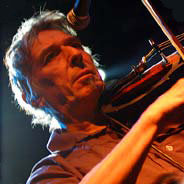Search
Rychard Carrington reports on John Cale – The Junction, Cambridge 28 Jan 2007

Tonight he delivered an astute show of strong music, without shedding any of his distance. He spoke little, but performed a smart set of very tight, proficient rock, whose harshness was mercifully leavened by gentler interludes in which his oblique Welsh lyricism came more to the fore. No viola this time, but keyboards, electric and acoustic guitars, backed by three razor-sharp musicians on drums, lead guitar and bass. His grey hair spiky at the top and brashly adorned with red streaks, Cale's modernity and lack of compromise are impressive/challenging from someone only three years younger than my mum. No crowd-pleasing Velvets numbers tonight, folks, but alongside powerful recent works was a goodly selection from the seventies albums, all tightened up for harder impact and fresh pertinence. The best elements in his unique repertory of styles came together in his first encore, Fear Is A Man's Best Friend, possibly both his greatest song and his definitive statement, splendidly presented tonight with screaming climax, taut rock energy and elegant keyboard additions which sounded just like a piano (remember them?). Then came Chorale, in which he could have passed as a Welsh Alex Harvey, and a fine ambient farewell with Gravel Drive. Cale amply proved his entitlement to the status of grand old master, whilst eschewing complacent nostalgia, and remaining ultimately - frustratingly - elusive.
Writer: Rychard Carrington